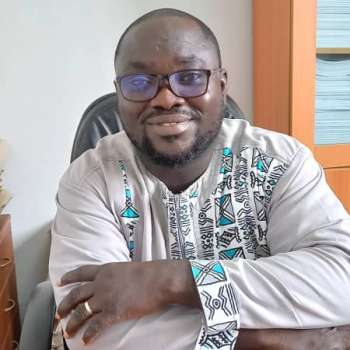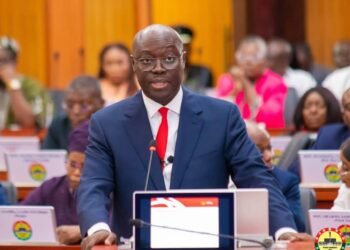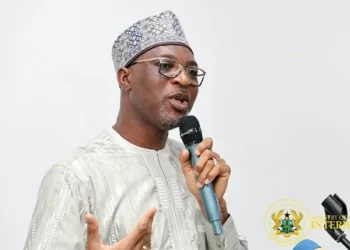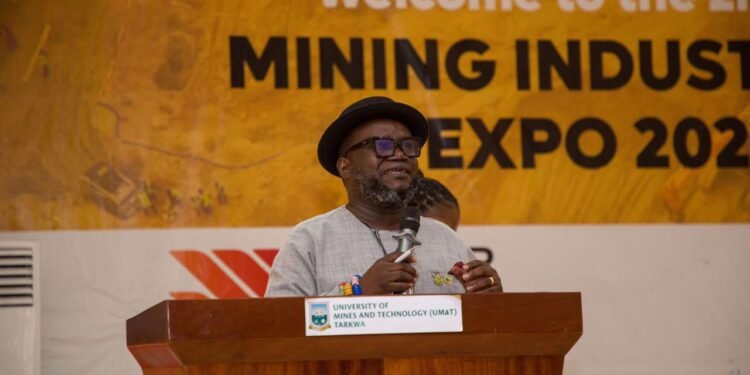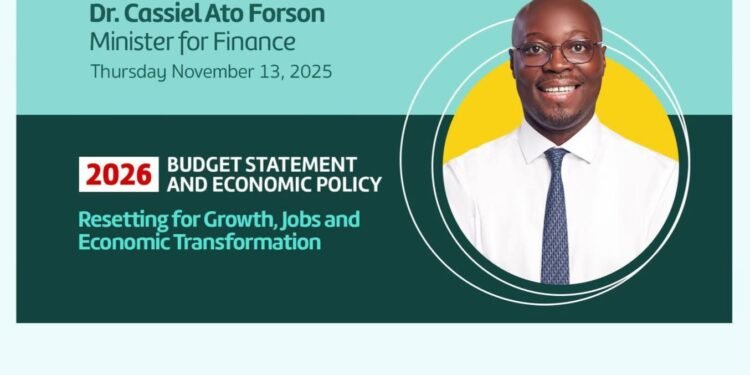In an exclusive interview with the Vaultz News, Dr Thomas Prehi-Botchway, a renowned Political Science Lecturer at the University of Education, Winneba, provided a stark analysis of the growing loss of trust in Ghana’s key governance institutions.
His remarks, which delve into the root causes and implications of this erosion, paint a troubling picture of the state of the country’s democratic and governance system.
Dr. Prehi-Botchway identified several critical factors contributing to the rising mistrust in governance institutions such as law enforcement, the judiciary, parliament, and the presidency.
One of the primary issues, he pointed out, is the flawed selection and appointment process of leaders who head these institutions.
“The mode of selection or appointment of people into leadership positions in these institutions is deeply problematic,” Dr. Prehi-Botchway asserted.
He emphasized that appointments often lack due diligence and professionalism, stating that “Most of these appointments are made by the president, so by the time these leaders assume office, they are already beholden to someone else,“stressing that this politicized process undermines the very foundation of trust.
“There are more factors. Maybe we will not have time to talk about all of them. But if you want me to talk about the root cause of some of these things, if it is about the lack of confidence on the part of the citizens, then it is telling us that something is wrong somewhere.
Because we put incompetent people in the hands of affairs. They are unable to deliver. And when people are expecting you to deliver and you don’t deliver, they lack faith in the system that has been put in place”.
Dr Thomas Prehi-Botchway, a Political Science Lecturer at the University of Education of Winneba
He argued that these failures perpetuate a cycle of disillusionment, where the public begins to view these institutions as ineffective and corrupt, leading to a steep decline in public confidence.
The Ripple Effect on Governance: Apathy and Vigilantism
According to Dr Prehi-Botchway, the consequences of this loss of trust are already manifesting in various aspects of Ghanaian governance, pointing out a deepening apathy and loss of patriotism among citizens.
“We don’t believe in the institutions any longer because people think they are inefficient,” he noted. The erosion of trust is evident in everyday actions, such as vandalism of political signage and retaliatory destruction of property, which he attributes to a lack of faith in law enforcement.
“When people lose faith in these institutions, they take the law into their own hands,” he warned. Dr. Prehi-Botchway recounted a recent instance in Winneba where political posters were torn down, leading to retaliatory acts of vandalism.
This, he argued, is a microcosm of a broader issue where citizens no longer trust the judiciary, police, or other state apparatuses to act impartially or effectively.
“You take your case to court five times, and the judge doesn’t show up. The police stop you at a checkpoint, not to enforce the law but to extort money. How do you expect people to trust these institutions?”.
Dr Thomas Prehi-Botchway, a Political Science Lecturer at the University of Education of Winneba
Impact on Elections: Apathy and Protest Votes Loom Large
Looking ahead to the 2024 elections, Dr Prehi-Botchway predicted significant ramifications of the growing trust deficit, asserting the loss of trust in several governance institutions “is going to have an impact on the upcoming elections”.
He stressed that the loss of faith in governance institutions could lead to widespread voter apathy, where citizens choose not to vote at all, or worse, protest by voting against the ruling administration, regardless of its performance.
Dr. Prehi-Botchway predicted that this disillusionment could result in either low voter turnout or a surge of protest votes, particularly directed at the governing New Patriotic Party (NPP),warning the ruling party to brace for a potential backlash.
“”I have personally engaged with people who ask, ‘What’s the point of voting?’ They feel that politicians, once elected, become lords over the people rather than servants, When people are dissatisfied, they vote against the government in power. It’s not about the past; it’s about the present”.
Dr Thomas Prehi-Botchway, a Political Science Lecturer at the University of Education of Winneba
Corruption Perception: A Reality, Not Just Perception
On the issue of corruption, Dr. Prehi-Botchway was particularly scathing. “Frankly, when I hear about the corruption perception index, I laugh,” he said, arguing that corruption in Ghana is more than a perception—it is a reality.
He pointed to numerous instances of mismanagement and graft exposed through parliamentary hearings and media investigations, emphasizing that these are not isolated incidents but part of a broader systemic failure.
“From police extortion on the streets to corruption in the judiciary, these are not perceptions; they are the lived realities of Ghanaians,” he asserted.
Dr Prehi-Botchway warned that the cumulative effect of these realities is a public that no longer trusts its institutions to act in their best interest, leading to further disengagement and even potential unrest.
The Bigger Picture: Implications for Democratic Stability
The long-term consequences of this trust erosion could be devastating for Ghana’s democratic stability, Dr. Prehi-Botchway warned.
He referenced Afrobarometer surveys, which document a steep decline in public trust in state institutions. “When only 7% of Ghanaians trust the police, how many will report crimes?” he asked, highlighting the dangers of a populace that no longer sees value in engaging with democratic processes.
For democracy to thrive, Dr. Prehi-Botchway argued, citizens must believe in the system. But when trust in institutions erodes to the extent seen in Ghana today, it threatens the very fabric of democratic governance.
“Some scholars have opined that to have a consolidated democracy. The people’s attitude, their behavior and their relations to the constitution and what have you should all matter. So they talk of democracy becoming the only game in town behaviorally, attitudinally, and constitutionally. Now when we are having what we are having I mean, just imagine 7% of Ghanaians have trust in the police service; so imagine how many people will report crime to the police.
“It is seriously going to affect our democratic credentials. For democracy to be consolidated, the people’s attitude towards law enforcement, towards rules and regulations and all these things matter. But when people begin not to trust, and we are talking about 6%, 7%, only this fraction, trust in state institutions, then we are in bigger trouble. If care is not taken, a time will come when we will have only registered party members going to the polls to go and cast their votes”.
Dr Thomas Prehi-Botchway, a Political Science Lecturer at the University of Education of Winneba
Dr Prehi-Botchway painted a grim picture of the future if these trends continue unchecked, adding that “after 30 years of voting every four years and seeing no change, what motivation is there for anyone to continue participating in the democratic process”, urging immediate reforms to restore public confidence in Ghana’s governance institutions.
Ghana’s Political Parties Neglect Institutional Trust Crisis
Moreover, Dr. Thomas Prehi-Botchway underscored how both major political parties, the National Democratic Congress (NDC) and New Patriotic Party (NPP), have failed to address this deepening crisis, focusing more on political rivalry than on institutional reforms crucial for national development.
Dr. Prehi-Botchway’s remarks highlighted the growing disconnect between the political class and the need for effective governance.
He criticized both parties for prioritizing electoral victory over addressing the core challenges plaguing Ghana’s institutions.
“I think they are focusing excessively on just winning power, especially the NPP administration,” he lamented. According to him, the NPP’s fixation on retaining power has led to the neglect of substantive reforms that could rebuild trust in key state institutions.
Dr. Prehi-Botchway’s disillusionment with the current administration’s efforts to combat corruption was especially sharp.
He questioned the effectiveness of the much-touted Office of the Special Prosecutor, which was established to tackle high-level corruption cases.
“They created an Office of the Special Prosecutor. What has it done so far? What are they doing? We hear allegations of public officials hoarding dollars in their homes, but no real action is taken,” he remarked. This lack of accountability, he posited exacerbates the erosion of trust in governance institutions.
The NDC, while receiving some credit from Dr. Prehi-Botchway for outlining plans to introduce mechanisms to combat corruption, does not escape his scrutiny.
“We’ve heard from the NDC’s candidate about plans to come in with new institutions and mechanisms to fight corruption, but I personally disagree with that approach. We have enough institutions to fight corruption; what we need is to make them functional, not create new ones that would only add to the financial burden on the state”.
Dr Thomas Prehi-Botchway, a Political Science Lecturer at the University of Education of Winneba
Dr. Prehi-Botchway’s critique underscores a crucial point: the solution is not more institutions, but ensuring the competence and autonomy of existing ones.
Dr. Prehi-Botchway also criticized the lack of action against political figures openly inciting violence, attributing this to the politicization of security forces.
“People make reckless statements, threatening violence, yet nothing is done because they belong to a particular political party,” he noted, pointing to the overall decline in the rule of law under the current government.
Institutional Reforms: A Critical Necessity
The Political Science lecturer did not shy away from proposing solutions, starting with a comprehensive review of Ghana’s 1992 Constitution.
He pointed out that many of the governance challenges the country faces today stem from inherent flaws in the constitution, particularly the excessive power granted to the president in appointing heads of key institutions.
“The president appoints too many people in this country,” he said, drawing from the Akan proverb that “every living thing begins to rot from the head,” a metaphor illustrating how institutional decay begins at the leadership level.
Dr. Prehi-Botchway urged the next government to revisit the work started by the late President John Evans Atta Mills’ Constitutional Review Committee, arguing that substantive changes are needed to rectify these flaws.
Without constitutional reforms, he warned, political appointments will continue to compromise the effectiveness and independence of governance institutions, perpetuating the cycle of mistrust and inefficiency.
Lessons from Other Democracies: The USA Example
Dr. Prehi-Botchway drew comparisons with other democracies, particularly the United States, where institutions maintained their independence even in the face of political pressure.
Referring to former President Donald Trump’s attempts to challenge the 2020 election results, the contrast, he noted, is stark when comparing this to Ghana, where institutions frequently fail to act impartially due to the political influence exerted by the president and other powerful figures.
“Trump wanted to use state apparatus to stay in office, but the institutions did not give him the support he sought. They worked fairly and justly to ensure that a new government came into office. In our part of the world, people are more concerned about getting promotions from the president than doing what’s right for the country”.
Dr Thomas Prehi-Botchway, a Political Science Lecturer at the University of Education of Winneba
He emphasized that Ghanaian institutions must learn from this example and prioritize the rule of law over political patronage.
Restoring Trust: The Role of Civic Education and Accountability
Dr. Prehi-Botchway also highlighted the role of civic engagement, transparency, and accountability in reversing the decline in public trust.
In particular, he emphasized the need to strengthen the National Commission for Civic Education (NCCE), which, in his view, is severely underfunded and underutilized.
“I grew up not really seeing what the NCCE does to educate Ghanaians on their civic responsibilities,” he said, arguing that a well-resourced NCCE could play a pivotal role in shaping a more engaged and responsible citizenry.
He called for a comprehensive overhaul of the NCCE’s operations, noting that equipping the institution with the necessary resources would go a long way in ensuring that Ghanaians understand their rights, responsibilities, and the importance of holding public officials accountable.
“If from our infancy, we are educated on our civic duties and grow up with a positive mindset toward nation-building, we won’t just be seeking to win power for the sake of it,” he said, stressing that long-term civic education could reduce the level of political apathy and disillusionment.
Conclusion: Urgent Action Needed to Restore Public Trust
Dr Prehi-Botchway’s insights paint a concerning picture of Ghana’s current political and institutional landscape.
His critique of both major political parties, especially the NPP, underscores the urgent need for institutional reforms and a recalibration of priorities toward governance and accountability.
As the 2024 general elections approach, his call for a focus on constitutional review, institutional reforms, and civic engagement resonates with growing public sentiment that Ghana’s democracy, while resilient, is under significant strain.
Without meaningful changes, the trust deficit between the government and the governed will only widen, threatening the very fabric of Ghana’s democracy.
Dr. Prehi-Botchway’s clarion call is clear: Ghana must act now to restore public faith in its institutions before it is too late.
READ ALSO: Prophet Kumchacha Slams Ohemaa Mercy Over Divorce Claims

